|
Blackface Around the World
Blackface certainly isn't unique to America. Other
countries have their own racist traditions. Perhaps by highlighting this
common thread, it will help to convince those who refuse to see the
racism inherent in some of their cultural traditions.
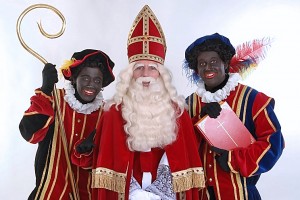
Zwarte Piet
Netherlands -- St Nicholas Day is celebrated in the Netherlands on
December 5, with the arrival of Santa Claus (Sinterklaas), and his helper 'Zwarte Piet' or Black Pete.
Together with Sinterklaas, Zwarte Piet helps deliver holiday gifts and sweets to those children who have been
good. If you've been bad, the legend says that Black Pete will kidnap you in his sack and take you back to Spain.
The Zwarte Piet character made his debut as an African servant in an 1850
book and is an important part of most public Christmas celebrations in
the Netherlands.
More on Zwarte Piet
/ Black Pete
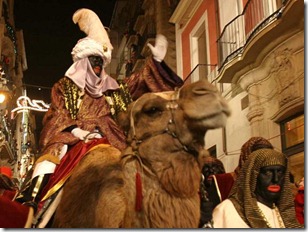
Balthazar
Spain -- Traditionally the three Wise Men or the Three Kings gave out gifts on January 6.
Spaniards paint their faces black in order to 'realistically' portray Balthazar in parades and in church festivals. The Pan African Center, based in Madrid, has just launched a unique campaign
to end the practice of having white men paint their faces black ("in a ridiculous and unnecessary
parody") and instead have actual black men portray Balthazar.
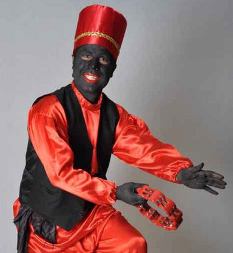
Haji Firooz (Haji Firuz)
Iran -- During the Persian New Year (March 20 or
21) celebration called Nouruz (Nowruz), minstrels, referred to as Haji
Firooz parade through the streets with tambourines, kettle drums, and trumpets to spread good cheer and the news of the coming new year. While many
Iranians regard Haji Firoozz as a sort of Santa Claus figure, unlike his
western counterpart, Haji Firoozz is black. In Iran, historians like Mehrdad Bahar have tried to explain away the blackface with references to ancient Iranian symbols, but his theories
have been met with much skepticism by academics. Instead, another scholar, Jafar Shahri presented Haji
Firooz as a more contemporary addition to the Norooz cheer, an African slave who serves an Iranian master. This version is supported by his
Nouruz rhyme, in which Haji Firooz addresses his master and encourages him to hold his head up high and be jolly.
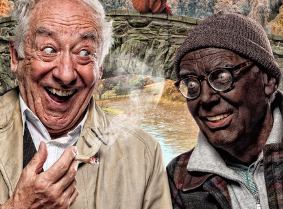
German Theatre
Germany -- In Germany it is common practice for
black roles to be portrayed by whites in blackface. American playwright Bruce Norris
wrote a letter to the American Dramatists Guild after canceling German rights to his play
'Clybourne Park'
because the producers intended to cast white actors and put them in
blackface. Norris wrote, "...blackface has been and continues to be a widespread practice on the German stage. German actors of African descent are routinely passed over for roles explicitly designated for them in some of the largest theatres in the country. This is weakly defended as either a director's prerogative or a matter of
"artistic choice."
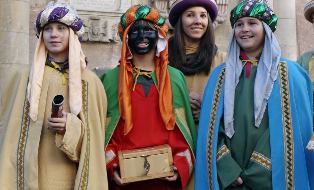
Three Wise Men
Germany - Austria -- Children in Germany and
Austria go door to door pretending to be the Wise Men celebrating the birth of Jesus. They sing and ask for donations for charity while wearing costumes. One
child wears blackface because it is believed that one of the wise men was from Africa.
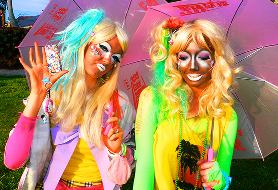
Ganguro
Japan -- Ganguro is a Japanese Street Fashion which translates
literally as "blackface." The look consists of bleached hair,
a very dark
tan (or makeup), black eyeliner, white makeup around the eyes and lips, platform shoes, neon colored outfits, and lots of
jewelry. The style its roots in the mid-1990's, starting with a desire among Japanese girls to
rebel against the traditional Japanese concepts of beauty; of pale skin, dark hair, and neutral makeup
tones.
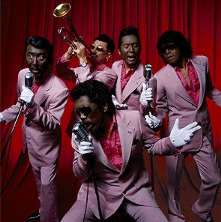
Gosperats
Japan -- The Gosperats perform old Motown hits in
in blackface and they record under the Sony Music label. The Gosperats
insist that they don't wear blackface to be offensive so people who are
offended should just get over it.
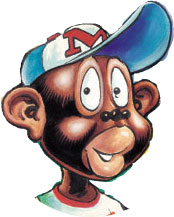
Memăn Pinguăn
Mexico -- Memăn Pinguăn is a fictional character from Mexico. Stories featuring
him first appeared in the 1940s.
Beloved by Mexicans for his dim wits, street smarts and playful disposition,
this long-running comic book character is drawn as a little black boy whose face resembles a monkey. When Mexico celebrated its centennial
in 2005, a collection of Memăn Pinguăn stamps was issued to
commemorate his contribution to Mexican culture.
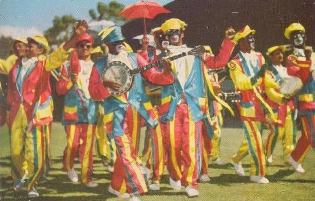
Coon Carnival
South Africa -- The Kaapse Klopse (or simply Klopse) is a minstrel festival that takes place annually on 2 January, in Cape Town, South Africa. As many as 13,000 minstrels take to the streets
garbed in bright colors, either carrying colorful umbrellas or playing an array of musical instruments.
In response to complaints, city leaders have renamed the event the
"Cape Minstrel Carnival" but the blackface remains.
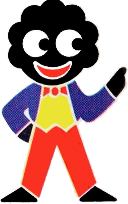
Golly
Europe -- The Golliwog image is popular in many European countries,
and is found on a variety of consumer items; including postcards, jam jars, paperweights, brooches, wallets, perfume bottles, wooden puzzles, sheet music, wall paper, pottery, jewelry, greeting cards, clocks, and dolls.
The Golliwog began life as a story book character. During the first half of the twentieth century, the Golliwog doll was a
favorite children's soft toy in Europe and America. The English preserves company,
Robertson's Jams has been using a smiling Golliwog as its logo since the 1920s, and still does.
After heated criticism during the 1960s and '70s, they simply changed their logo's name to 'Golly', and continued
to promote their products with their trusty mascot.
Golliwog is considered a racial slur in Germany, England, Ireland, Greece, and Australia.
It is sometimes applied to dark-skinned Whites, as well as brown-skinned persons. Golliwog is also a common name for black pets, especially dogs, in European countries.
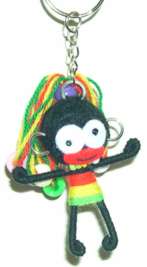
Golly
Thailand -- I received this key chain as a gift
from an Amazon Marketplace seller located in Thailand thanking me for my
purchase. The wrapping says "Made in Thailand."

Dunkin' Donuts Blackface
Thailand -- The Dunkin' Donuts franchise in Thailand
recently launched a campaign for its new "Charcoal Donut," featuring
a model in blackface makeup. Human Rights Watch said that it was shocked to see an American brand name running an advertising campaign that would draw
"howls of outrage"ť if released in the United States.
Dunkin' Donuts' CEO in Thailand, Nadim Salhani, dismissed the criticism as
"paranoid American thinking"ť and called it "absolutely ridiculous."ť
In Thailand it is common for advertisements to use blackface stereotypes.

Adelaide
Brazil -- Recently, the program Zorra Total of the Globo TV network,
featured the actor Rodrigo Sant'anna (Santana) wearing blackface and
makeup and portraying a black woman. Adelaide is a beggar on the subway
who manifests many of the negative stereotypes Brazilians attribute to blacks;
lazy, dirty, ugly, toothless, and ignorant.
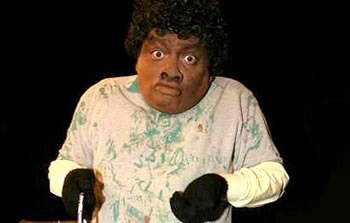
El Negro Mama
Peru -- Negro Mama "is the most racist character I have ever
seen in my life"ť said professor Henry Louis Gates Jr. when he saw it in Lima.
Played by an actor wearing a rubber mask, the wild-haired character has
bulging eyes, sports silly clothes and speaks slowly with an exaggerated
accent. El Negro Mama is portrayed as a common criminal who is both lazy and stupid.
The character and the show are quite popular in Peru and producers have refused to take it off the air despite protests from Lundu, a "civil rights" group. Many Peruvians do not find El Negro Mama racist
at all. In Peru, racial stereotypes are reinforced on a daily basis in the
media. In Peruvian society (as in many Latin American countries) African descendents are
discriminated against and marginalized, resulting in widespread poverty
and alienation.
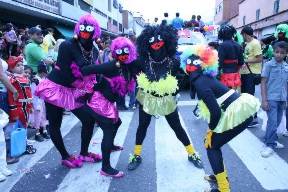
La Negrita
Venezuela -- The tradition of the carnival in Venezuela began
during the Spanish conquest and was characterized by games with water, eggs, and other substances; customs that continued for many years. In the
mid-1950s and 1960s the "bold" emerged -- people who dressed up in costumes
to enjoy the holidays without any inhibitions. The negritas costume
began with white women dressed as blacks in order to follow their husband to parties and test their
faithfulness by trying to seduce them.
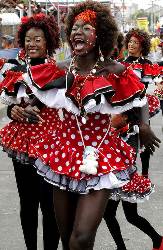
La Negrita Puloy
Columbia -- During Carnaval de Barranquilla women paint themselves in blackface and dress in the
red and white polka dress of the Negrita. This costume was inspired by
a brand of Ecuadorian detergent in the 70's.
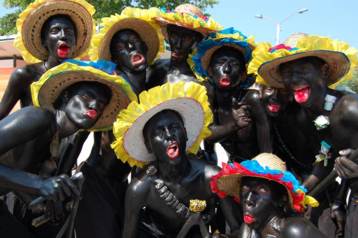
Son de Negro
Columbia -- During Carnaval de Barranquilla men paint themselves in blackface and make twitching faces that are supposed to resemble what black people look like.
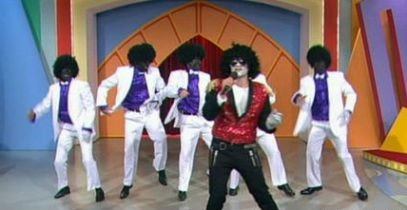
The "Jackson Jive"
Australia -- When New Orleans jazz musician Harry Connick Jr. appeared as a judge on Australian television show
"Hey Hey It's Saturday,"ť he was stunned when a group called the Jackson Jive (a twist on the legendary R&B group the Jackson Five) appeared in blackface and Afro wigs during their performance. He lambasted the group's decision to darken their faces, remarking,
"I just want to say, on behalf of my country, I know it was done humorously, but we've spent so much time trying to not make black people look like buffoons, that when we see something like that we take it really to heart."ť Connick's criticism spurred debate about how blackface is viewed around the world. Australians defended the Jackson Jive's decision to perform with darkened faces, arguing that blackface does not have the same stigma that it does in the United States.
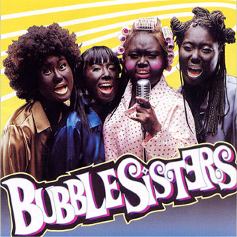
The Bubble Sisters
South Korea -- The Bubble Sisters are a group of four Korean girls
in their mid-twenties who debuted in blackface with plastic lips. One of the members
even had rollers in her hair. When confronted about the issue of their act
being racist, Nanda the lead singer of the Bubble Sisters, responded, "We
want to undermine the typical Korean band, who are pretty but don't have any
talent, and open doors to musically talented people who, if they don't fit into
this compartment, are usually forced underground." She also went on to state, "We love black
music...We just thought it was fun to play around with the image, we didn't mean to link ugliness to being
black."
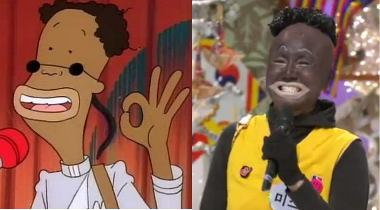
Maikol
South Korea -- The Lunar New Year special of MBC's
"Quiz that Changes the World" featured comedians Lee Gyeong-sil and Kim Ji-seon in black face wearing basketball jerseys and singing,
while portraying the cartoon character Maikol, based on Michael Jackson,
on the popular Korean cartoon show Dooly.

Blackface for UNICEF
Germany -- In 2007, advertising agency Jung von
Matt/Alster did a pro bono ad campaign for UNICEF Germany about the education crisis in Africa. The campaign
used white kids in blackface to represent "uneducated Africans."ť
UNICEF dropped the campaign after they received numerous complaints and
condemnation.
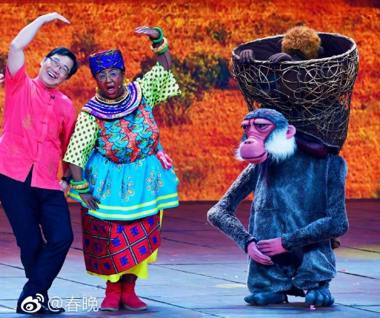
China TV
China -- In 2018, a comedy sketch on China's
biggest Lunar New Year television show featured a Chinese actress in
blackface and giant fake buttocks to depict an African female. The scene
also included a black performer playing a monkey.
|

